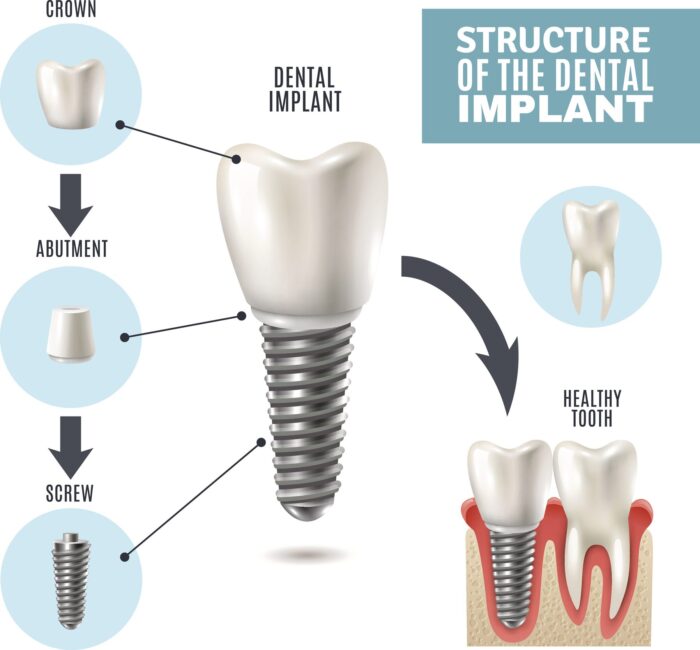Dental Sense for Dummies
The Only Guide for Dental Sense
Table of ContentsDental Sense Things To Know Before You Get ThisWhat Does Dental Sense Mean?Facts About Dental Sense RevealedHow Dental Sense can Save You Time, Stress, and Money.
are clinical gadgets operatively dental implanted right into the jaw to restore a person's ability to eat or their look. They provide assistance for man-made (phony) teeth, such as crowns, bridges, or dentures. When a tooth is lost as a result of injury or condition, a person can experience issues such as fast bone loss, malfunctioning speech, or changes to chewing patterns that result in discomfort.Dental implant systems are composed of an oral implant body and oral implant abutment and may also include a joint fixation screw. Dental implants. The dental implant body is operatively inserted in the jawbone in place of the tooth's root. The oral implant joint is usually connected to the dental implant body by the abutment addiction screw and expands with periodontals into the mouth to support the affixed artificial teeth
(https://myspace.com/dentalsense1)Framework of The Oral Implant System selecting oral implants, speak to your dental supplier concerning the potential advantages and threats, and whether you are a prospect for the treatment. Points to consider: Your total wellness is an important factor in determining whether you are a good prospect for oral implants, how long it will certainly take to heal, and how long the implant may remain in location.
Smoking cigarettes may affect the recovery procedure and decrease the long-lasting success of the implant. The recovery process for the implant body may take several months or longer, during which time you usually have a short-term abutment in area of the tooth. the oral implant procedure: Thoroughly adhere to the oral health guidelines provided to you by your oral copyright.
The Main Principles Of Dental Sense
Implant failing can cause the need for one more operation to take care of or replace the implant system. Brings back the capacity to chew Recovers aesthetic look Assists keep the jawbone from shrinking due to bone loss Maintains the health and wellness of the bordering bone and periodontals Helps maintain adjacent (close-by) teeth secure Boosts lifestyle Damage to bordering natural teeth during dental implant positioning Injury to the surrounding tissues throughout surgical treatment, such as sinus perforation Injury throughout surgery (for instance, crack of surrounding jawbone) Insufficient function, such as seeming like the teeth do not attack together usually An experience that the tooth hangs or turning in area arising from a joint screw loosening up Implant body failure (looseness of the dental implant body) as a result of systemic infection, which may be most likely in people with unrestrained diabetes mellitus because of local infection in bone and gums supporting the dental implant body due to delayed recovery, which might be most likely in individuals that smoke Trouble cleansing the gums around the dental implant, causing poor dental health Without treatment gum illness Post-surgical pins and needles due to nerve impingement or damages Constantly inform healthcare service providers and imaging specialists that you have oral implants before any magnetic vibration imaging (MRI) or x-ray procedures.
FDA is not familiar with any damaging events reported for MRI or x-ray procedures with dental implants. Dental implants systems are usually constructed from materials that follow worldwide agreement requirements of the International Company for Standardization (ISO) or ASTM International. These criteria have information of what makes a secure product.

A dental implant is a framework that replaces a missing tooth. With screw-like devices, the cosmetic surgeon inserts a dental implant into the jawbone, and it acts as a support for a synthetic tooth, called a crown.
What Does Dental Sense Mean?
Some people are not qualified for dental implant surgery. It is for oral surgeons to operate on people with: severe illnessuncontrollable metabolic diseasebone or soft cells disease or infectionIf these problems are solved, an individual can have the surgical treatment. In, dental surgeons avoid operating on people with: If people with any one of the above undergo oral implant surgical procedure, there is a greater danger of the implant falling short.

Oral dental implant surgical treatment is an individualized process. It's not the exact same for everyone. But the following offers a general review of what you can expect your dentist, oral doctor, periodontist or prosthodontist to do: Place the dental implant operatively. Offer you time to recover. Attach the post and last crown, bridge or denture.
Next off, your doctor will thoroughly position the oral implant into your jaw. If your dental implant is near the front of your mouth, your dental expert will certainly make a temporary tooth for you to put on up until you recover.
The smart Trick of Dental Sense That Nobody is Talking About
Your supplier can inform you what to anticipate in your scenario. During the healing phase, your jawbone needs to fuse to the oral implant. This process, called osseointegration, is vital for stability and long-term success. This procedure can take anywhere from three to 9 months. In many cases, it might take longer.
When your dental implant heals, your dental expert webpage can affix the abutment (small port post) and your final reconstruction (crown, bridge or denture). This normally takes about one hour to finish and may call for a second minor surgery. You should not feel any kind of discomfort during your oral implant treatment because your provider will certainly utilize medication to numb your gum tissues.